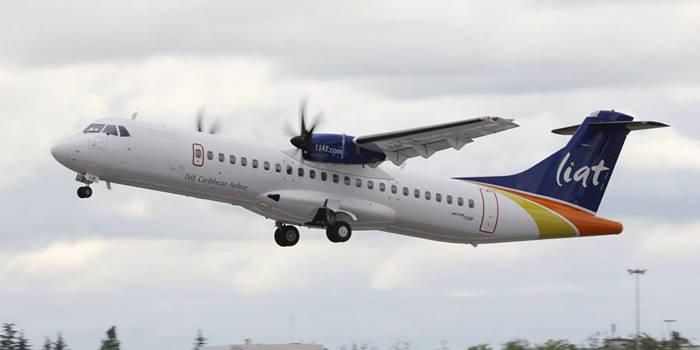Prime Minister Ralph Gonsalves, on Thursday, further commented on the “episodic” bouts of illness among LIAT’s flight crews, saying these increase when a carnival is taking place in a LIAT destination, but he stopped short of saying what might be the cause.
“And I have been told that if you were to draw a graph as to when you have a lot of festivals — Crop Over in Barbados, Carnival in different places, there appears to be a spike; what you may call episodic illnesses. I don’t know if there is any causal connection. All I can say is what I have been advised,” Gonsalves, who is chair of LIAT’s shareholder governments, told the St. Vincent and the Grenadines Parliament on Thursday.
“I want to make the point, however, that the overwhelming majority of the crew are very hardworking and they do a good service to the company, and I want to thank them,” Gonsalves said.
He detailed to Parliament some of the challenges facing the cash-strapped regional carrier into which his government will pump a further EC$600,000 before year end as part of an EC$5 million capital boost.
In a ministerial statement to Parliament, Gonsalves gave details of a shareholders’ meeting he chaired in Barbados on Oct. 19.
He had briefed the media in Barbados after the meeting, but told Parliament that while he explained several operational challenges that hinder LIAT’s reliability, only the illness of the crew was reported on.
He further said LIAT’s pilots’ union, LIALPA, issued a statement dealing with things other than the illness, saying this was done as though he had only spoken about that.
In a statement last week, LIALPA said that crews were falling ill because of chemicals used to address a roach infestation on the airline’s aircraft, and because of the long hours that they work — sometimes without meal breaks.
Gonsalves told Parliament that the management of LIAT has informed shareholders that “LIAT crew sickness level for 2016 equates to 13 per cent, a pattern that has been in existence for some time.
“These sickness levels are unsustainable for a commercial airline,” he told lawmakers, including the opposition New Democratic Party, which has criticised the government’s approach to LIAT.
The industry daily average is between 3 and 5 per cent, Gonsalves said, adding, “Indeed, LIAT management had indicated to me that where you have the largest bundle of cancellations caused by crew sickness is caused by 18 per cent of the crew.”
LIAT has 104 pilots and 76 cabin crew members and the management is satisfied that the company has a sufficient crew to operate the current schedule, which it executes, using nine aircraft: five ATR 42 and four ATR 72, Gonsalves said.
A 10th aircraft is expected to be received on Nov. 7 and will go into operation next year, after additional crew are trained.
The island-hopping carrier operates
548 weekly flights, 78 of them daily to 18 destinations, 16 of which it services with its ATRs, while both Anguilla and Nevis are serviced through sub-charter with Caribbean Helicopters.
Gonsalves said he has been advised that LIAT’s pilots fly an average of 42 hours over a period of 28 days, which he said is “well within the regulatory requirement and there are guaranteed payments for a minimum of 55 flight hours”.
Other challenges that the airline faces include wind conditions in St. Vincent and in Dominica.
Another operational challenge is weak technology systems, some of which are old and sometimes LIAT only has a manual system.
“An operation challenge relates to some of the support ground equipment. Some of it is old and some of it non-functioning,” he said.
But he admitted that the airline also has challenges with some of the frontline staff.
“Sometimes, they get overwhelmed. And let me just hasten to add, not all the staff at the front in all the airports are employed by LIAT.” That is the case in ST. Vincent, but in Barbados, it is outsourced.
“And we have to ensure better training because of the staff. We know they are working under difficult circumstances. Sometimes, they don’t get all the requisite information from the headquarters, but we need to do better at the frontline because, let us face it, that is where you have a lot of angst, a lot of anger from the travelling public with LIAT,” Gonsalves said.
He said he sympathizes with that angst.
“I have been myself subject to waiting for unreasonably long periods of time sometimes. But you know, if you are supposed to take 20 minutes, 25 minutes to do your turn around with your ATRs but you have a problem with your equipment on the ground, there are also things outside of LIAT’s control,” he said.
Among these, Gonsalves mentioned the slow pace of the security checks, adding that because of LIAT’s small number of planes, with these delays, flights tend to run later.
He also spoke of early airport closure in Dominica, in St. Lucia, in Grenada and in St. Vincent. He said LIAT and the airport authorities in these countries have to work closer on this matter.
The prime minister said that sometimes in some countries there is very late port health inspection, another development outside of LIAT’s control.
All of these problems have a knock-on effect, Gonsalves said.
He also said that LIAT has an inefficient baggage tracking system.






